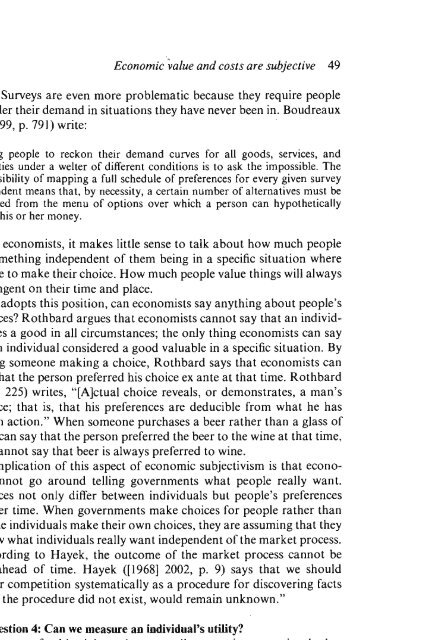Handbook on Contemporary Austrian Economics
Handbook on Contemporary Austrian Economics
Handbook on Contemporary Austrian Economics
You also want an ePaper? Increase the reach of your titles
YUMPU automatically turns print PDFs into web optimized ePapers that Google loves.
Ec<strong>on</strong>omic value and costs are subjective 49<br />
surveys. Surveys are even more problematic because they require people<br />
to c<strong>on</strong>sider their demand in situati<strong>on</strong>s they have never been in. Boudreaux<br />
et al. (1999, p. 791) write:<br />
Asking people to reck<strong>on</strong> their demand curves for all goods, services, and<br />
amenities under a welter of different c<strong>on</strong>diti<strong>on</strong>s is to ask the impossible. The<br />
impossibility of mapping a full schedule of preferences for every given survey<br />
resp<strong>on</strong>dent means that, by necessity, a certain number of alternatives must be<br />
excluded from the menu of opti<strong>on</strong>s over which a pers<strong>on</strong> can hypothetically<br />
spend his or her m<strong>on</strong>ey.<br />
To these ec<strong>on</strong>omists, it makes little sense to talk about how much people<br />
value something independent of them being in a specific situati<strong>on</strong> where<br />
they have to make their choice. How much people value things will always<br />
be c<strong>on</strong>tingent <strong>on</strong> their time and place.<br />
If <strong>on</strong>e adopts this positi<strong>on</strong>, can ec<strong>on</strong>omists say anything about people's<br />
preferences Rothbard argues that ec<strong>on</strong>omists cannot say that an individual<br />
values a good in all circumstances; the <strong>on</strong>ly thing ec<strong>on</strong>omists can say<br />
is that an individual c<strong>on</strong>sidered a good valuable in a specific situati<strong>on</strong>. By<br />
observing some<strong>on</strong>e making a choice, Rothbard says that ec<strong>on</strong>omists can<br />
deduce that the pers<strong>on</strong> preferred his choice ex ante at that time. Rothbard<br />
(1956, p. 225) writes, "[A]ctual choice reveals, or dem<strong>on</strong>strates, a man's<br />
preference; that is, that his preferences are deducible from what he has<br />
chosen in acti<strong>on</strong>." When some<strong>on</strong>e purchases a beer rather than a glass of<br />
wine we can say that the pers<strong>on</strong> preferred the beer to the wine at that time,<br />
but we cannot say that beer is always preferred to wine.<br />
The implicati<strong>on</strong> of this aspect of ec<strong>on</strong>omic subjectivism is that ec<strong>on</strong>omists<br />
cannot go around telling governments what people really want.<br />
Preferences not <strong>on</strong>ly differ between individuals but people's preferences<br />
differ over time. When governments make choices for people rather than<br />
letting the individuals make their own choices, they are assuming that they<br />
can know what individuals really want independent of the market process.<br />
But according to Hayek, ~he outcome of the market process cannot be<br />
known ahead of time. Hayek ([1968] 2002, p. 9) says that we should<br />
"c<strong>on</strong>sider competiti<strong>on</strong> systematically as a procedure for discovering facts<br />
which, if the procedure did not exist, would remain unknown."<br />
4.5 Questi<strong>on</strong> 4: Can we measure an individual's utility<br />
The next area of subjectivism where not all ec<strong>on</strong>omists agree is whether<br />
subjective utility is measurable. Some ec<strong>on</strong>omists believe that individuals<br />
value goods based <strong>on</strong> their subjective preferences, but also believe<br />
that how much they value goods can be measured by external parties.<br />
The idea is that just as doctors observe heart rates using stethoscopes,

















